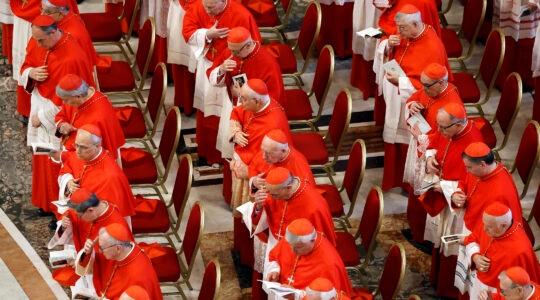NEW YORK, Feb. 24 (JTA) — Strange as it may sound to most ears, cooperation rather than conflict “is the dominant theme between African- Americans and Jews,” according to a recent study. The 55-page report, released last week by The Foundation for Ethnic Understanding, documents hundreds of instances of cooperation between the two groups during the past year. It is the second such study by the group. According to Rabbi Marc Schneier, president of the New York-based organization, the media prefers to report on conflict, creating false perceptions that relations between Jews and African Americans are in a state of decline. Among the 1997 events highlighted in the report: * On Jan. 3, the world’s first black/Chasidic rap group performed for local high schools in New York City; * On April 10, 220 people, representing seven African American churches and seven synagogues attended a Passover seder sponsored by the Jewish community relations council of Greater Washington. Similar seders are taking place annually around the country; * On Aug. 9, a group of Clevelanders went to South Carolina under the auspices of the local Jewish federation’s community relations council to help rebuild the Spring Hill AME Church destroyed by arson the previous year. Holocaust survivors were among the group, which spent a week hammering nails alongside the black parishioners; * On Sept. 2, Rabbi Richard Agler and Arthur Anderson, a former Palm Beach, Fla., county school board chairman, announced a new education initiative, The Black-Jewish Coalition for Quality Public Education. Within the chronological account, the study includes the tensions and conflicts provoked by the actions of Louis Farrakhan, leader of the Nation of Islam, and other racial eruptions around the United States. But it still found that cooperation far outnumbered the conflicts between the two groups. Last year’s report led to a conference at Yeshiva University in New York called “African-Americans and Jews: A Dialogue for the 21st Century.” It was attended by 300 African-American and Jewish leaders, and was addressed by Kweisi Mfume, president of the NAACP, Hugh Price, president of the National Urban League, and Israel Singer, secretary general of the World Jewish Congress. In addition, the report has been a source of information for students, community groups, churches, synagogues and elected officials nationwide, according to Schneier.
JTA has documented Jewish history in real-time for over a century. Keep our journalism strong by joining us in supporting independent, award-winning reporting.





